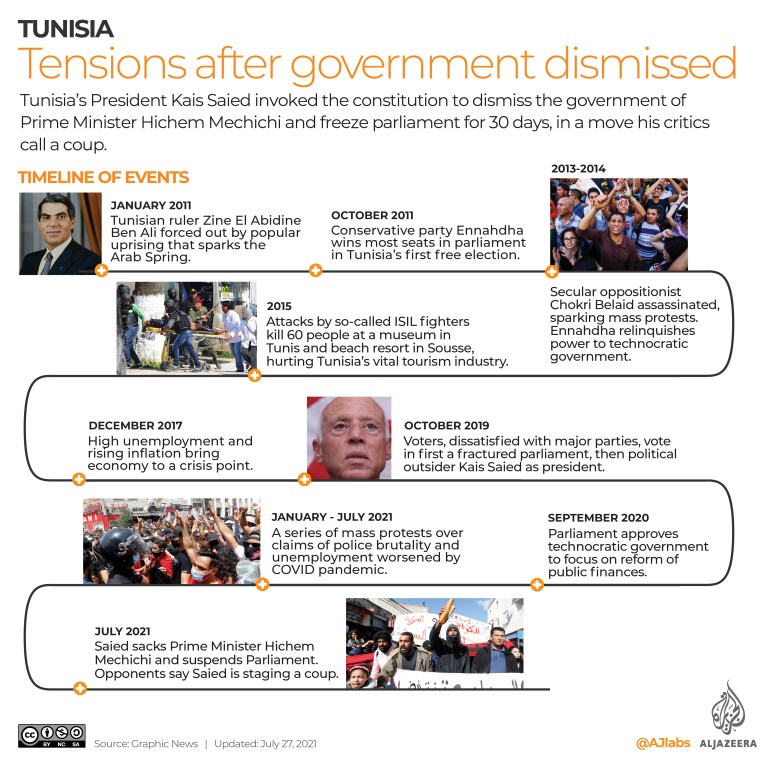Ennahda calls for dialogue to resolve Tunisia’s political crisis
Tunisia’s largest party calls for dialogue after the president sacked PM and suspended parliament causing a constitutional crisis.

Tunis, Tunisia – Tunisia’s largest political party has called for dialogue to resolve the political crisis, changing tack after initially urging MPs and its supporters to protest outside parliament in the capital Tunis on Monday.
In a statement published on Tuesday, the Islamist Ennahdha party reiterated that they considered President Saied’s decision to suspend parliament and sack the prime minister as “unconstitutional”, but took a more conciliatory approach, calling on Saied to reverse the measures.
Tunisia, touted as a success story of the 2010 Arab Spring revolutions, is facing deep political uncertainty after the president froze parliament for 30 days and fired Prime Minister Hichem Mechichi amid rising COVID cases and a faltering economy.
Mechichi on Monday night announced he would hand over responsibility to whomever the president chooses “to avoid any further blockage at a time when the country needs to join forces to get out of this crisis situation on all levels”.
Keep reading
list of 4 itemsTunisia police storm Al Jazeera bureau in Tunis
Tunisia: Sacked PM says will hand over responsibility
World reacts to Tunisia’s political turmoil
Saied’s decisions came after anti-government protests took place across the country, prompted by the government’s mismanagement of the COVID-19 crisis but also rooted in the country’s economic stagnation, rising living costs and frustration with a political class embroiled in infighting.
The president’s decision was met with jubilation, with tens of thousands of Tunisians hitting the streets across the north African nation. The Ennahda party flags were burnt and the party offices were targeted in some parts of the country.
‘A position of containment’
Initially, Rachid Ghannouchi, the speaker of parliament and leader of Ennahda, called on MPs and supporters to stage a sit-in outside parliament denouncing the president’s “coup” after many MPs were denied access to parliament by the army on Monday.

A couple of hundred protesters gathered on Monday; however, the turnout was limited and mixed, with groups there to support the president’s decision and others to oppose the move.
“They moved to a position of containment, not opposition as it was in the first place,” said Hamza Meddeb, analyst at the Carnegie Middle East Centre, adding that the number of supporters that came out was lower than Ennahda had hoped.
“Confrontation in the streets would be costly and bloody and will delegitimise them so they are choosing political channels but keeping their position to reject the decision,” he told Al Jazeera.
On Monday, the president decreed a night-time curfew from 7pm to 6am local time and a ban on gatherings of more than three people, which means that protesters could risk confrontation with security forces.

Throughout Monday, Saied issued a number of presidential decrees, dismissing the defence minister and acting minister of justice, and stopping the work of administrations for two days with a possible extension.
Saied spent the day meeting with representatives from various civil society groups and unions, as well as representatives of the judicial councils.
The offices of Al Jazeera were raided on Monday and its keys confiscated, a decision condemned by the Qatar-based Network. Al Jazeera Media Network in a statement said it viewed the raid as “an attack on press freedom”.
The powerful workers union, the UGTT, came out in support of Saied but underlined that there must be guarantees that these exceptional measures will be limited and not become permanent.
For now, the majority of political parties have criticised Saied’s move as unconstitutional, including the coalition of Ennahda, Karama Coalition and Qalb Tounes, as well as the centrist Democratic Current, which tended to align itself with the president in the stretched out political conflict with the prime minister and his backers in parliament.
The president says that his actions are constitutional under Article 80 of the constitution, which allows the president to take any measures in the event of “imminent danger” after consultation with the presidents of government and parliament.
But many view his actions as exceeding the limitations of the constitution.
“Suspending parliament doesn’t square well [with article 80] but in the absence of a constitutional court, it is the president that interprets. He is the guarantor of rights and of the constitution,” said Amna Guellali, deputy regional director for Amnesty International, adding that whether or not it is constitutional does not matter as much as who holds the power on the ground.